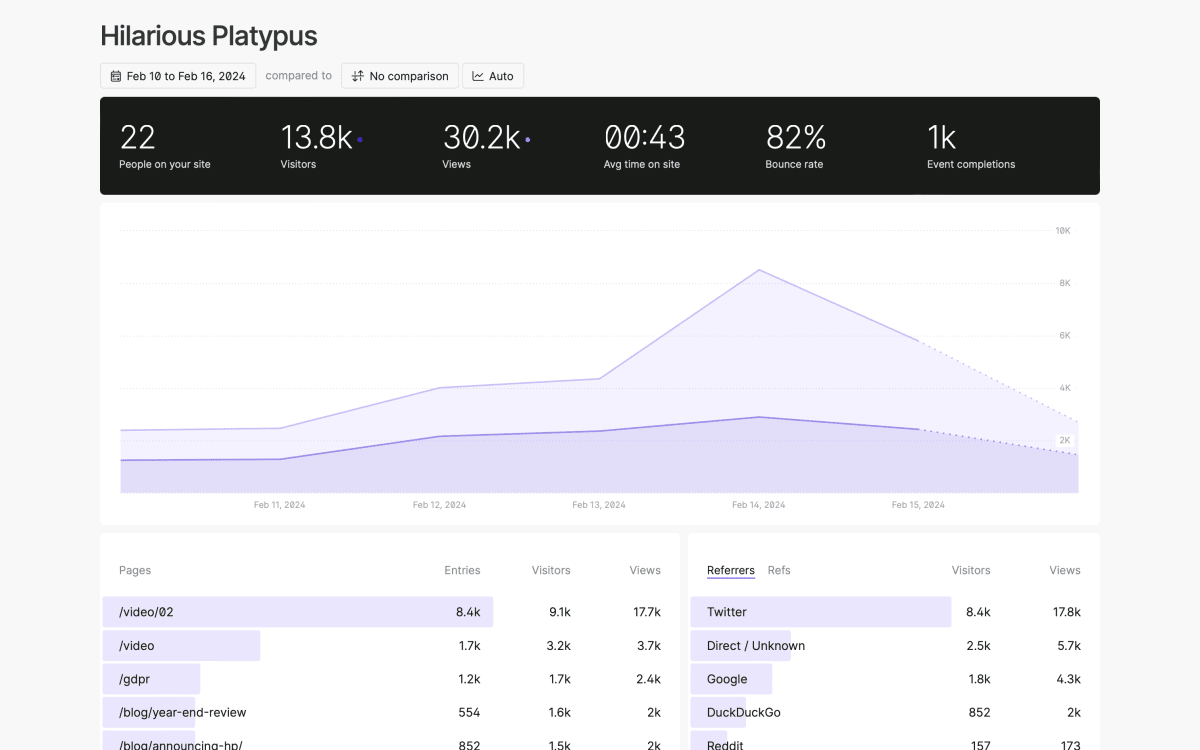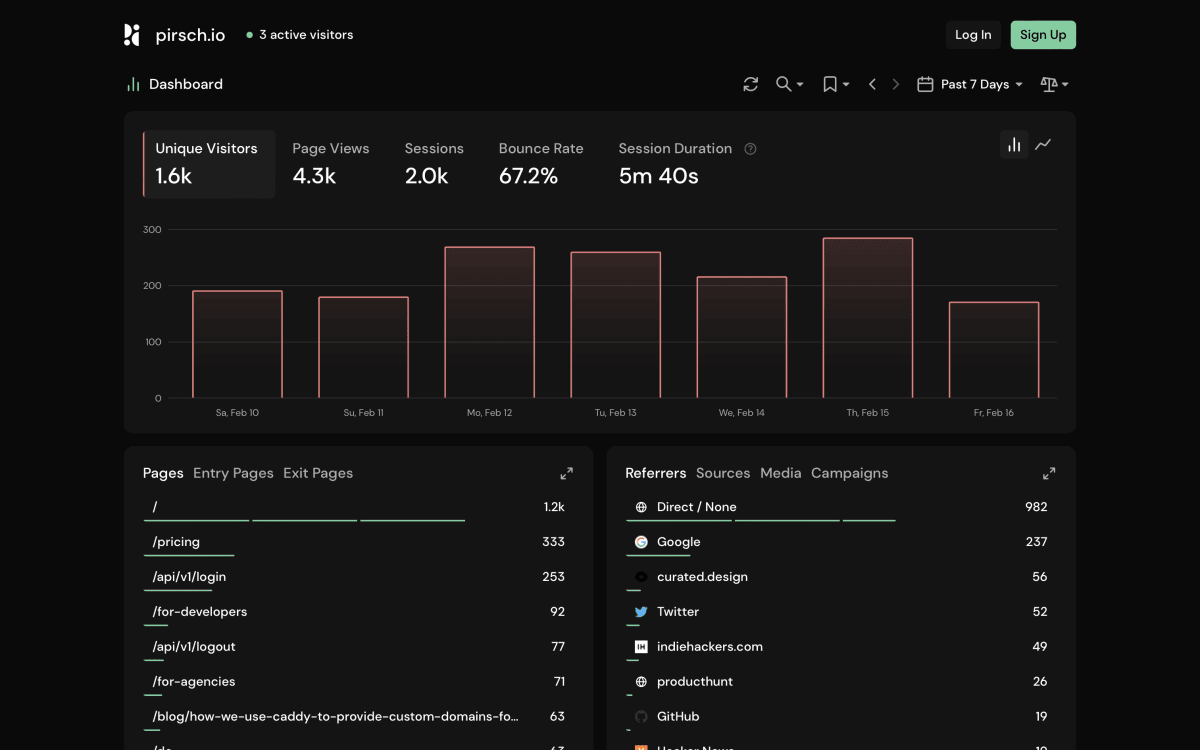
6 minutes read
The best GDPR-compliant Google Analytics alternatives (2024)
Feb 16, 2024
Benjamin Crozat
Table of contents
Why switch away from Google Analytics?
Google Analytics is a clunky analytics provider, even in its 4th version.
But that’s not it. The biggest issue for many businesses is GA4’s lack of full GDPR compliance. The platform still collects personal data and processes it outside the EU.
To use Google Analytics 4 in compliance with the GDPR, you should implement IP anonymization, refrain from sharing GA4-collected data with other Google products, obtain explicit consent from end-users to use Google Analytics cookies, and update your website’s privacy policy.
Needless to say, this will be a waste of time and money for most of us. So let me show you my listing of the best alternatives.
My recommendations by price
| Name | Price for 100K data points | Free trial |
|---|---|---|
| Simple Analytics | $9 | 14 day |
| Pirsch Analytics | $12 | 30 day |
| Fathom Analytics | $15 | 30 day |
The best GDPR-compliant Google Analytics alternatives
Fathom Analytics
Fathom Analytics is one of the best GDPR compliant analytics platform. It serves a ton of serious businesses (GitHub, IBM, McLaren, and more) and can handle huge spikes of traffic due to its reliable architecture. If you are an enterprise customer, this is the one I recommend.
Besides its dashboard, here are features Fathom offers that you might like:
- EU isolation: Fathom processes EU visitor data in the EU and intelligently routes all other data.
- Forever data retention: The data on the dashboard stays there forever, allowing users to see historical data back to their first day of using Fathom Analytics.
- No cookie banners: Fathom does not use cookies, so there’s no need for a consent/cookie banner for analytics.
- Goal tracking: It supports goal tracking through events, which can be set up to track goals like newsletter signups, link clicks, or ecommerce sales.
Try Fathom Analytics for 30 days
Simple Analytics
Simple Analytics is as good as Fathom Analytics. It’s GDPR compliant (it’s hosted and operates in the EU), its dashboard is a joy to use both on desktop and mobile, and it also serves big customers such as governements, Michelin, Hyundai, and more.
Simple Analytics also offers features such as:
- Privacy Protection: The platform is designed to comply with various privacy policies, such as GDPR of course, but also PECR, and CCPA, ensuring that user data is protected.
- AI-driven insights: Users can chat with AI and their analytics, allowing for quick and easy access to website data.
- No personal data storage: Simple Analytics does not store any personal data about visitors, eliminating the need for cookie banners.
- Goals-tracker and events explorer: These features allow users to track important events and conversion funnels on their websites.
Try Simple Analytics for 14 days
Pirsch Analytics
Pirsch Analytics is still a relatively new actor on this market and operating in Germany. This is the one I use for this blog. It still has to prove itself in terms of reliability. But it’s by far the most beautiful and feature-complete tool.
- Personal support: The platform provides professional and competent support from IT specialists, ensuring that users receive help with integration details, networking, or programming when needed.
- Server-side integration: This is very useful to bypass ad blockers just like I do on this blog.
- Extensive plugin support: The platform can be easily integrated into websites using available plugins for various systems like WordPress and Laravel. It also offers a demo repository with sample applications and more, maintained by a community of developers.
- Access rights restriction: Give a role to each of your employees and control what they can see.
Try Pirsch Analytics for 30 days
What about the free and self-hosted alternatives?
There are a lot of self-hosted alternatives to Google Analytics. Questions are:
- Do you want to be responsible for the reliability of the infrastructure?
- Do you have time to dedicate to maintenance and technical issues?
If yes, here’s a list of some self-hostable alternatives:
What is GPDR?
GDPR, or General Data Protection Regulation, is like a big rule book that the European Union came up with to protect people’s privacy. Imagine every time you go online and share your name, email, or any little detail about yourself, GDPR makes sure that your information is kept safe and used right.
Legal stuff is always incredibly boring. So imagine the EU being like, “Hey, you need to be super clear about what you’re doing with people’s info, and if they ask you to delete their stuff, you gotta do it.” It’s all about giving you (the user) control over your personal information and making sure your privacy is respected, no matter where you’re surfing the web from.
The risks of not being GDPR compliant
If you’re not playing by the GDPR rules, you’re looking at a few serious risks. Let’s break them down:
-
Hefty fines: First and foremost, the fines for not following GDPR can be massive. We’re talking up to 4% of your annual global turnover or €20 million (whichever is higher). That’s enough to make a serious dent in your finances or even put you out of business if you’re not careful.
-
Reputation damage: When people find out your company doesn’t respect their privacy rights, trust goes out the window. Customers might start thinking twice before doing business with you, fearing their personal information isn’t safe.
-
Legal battles: Non-compliance can land you in legal hot water, facing lawsuits from individuals or groups. These legal battles are not just costly in terms of money; they also eat up a lot of time and energy.
-
Loss of business: If you’re not GDPR compliant, you may have to stop processing data from the EU until you get your act together. This could mean losing out on a significant market or having to halt operations that are crucial to your business.
-
Operational disruptions: Getting caught off guard by GDPR compliance issues can force you to make sudden changes to your operations, leading to disruptions, delays, and the need for quick fixes that may not be in your long-term best interest.


